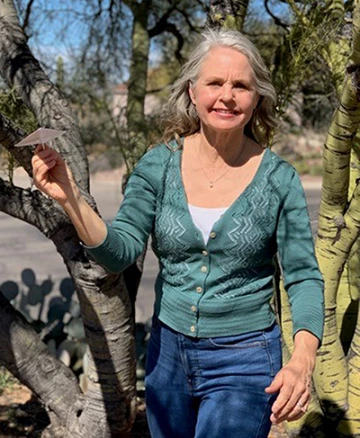One-on-One with Mentor Heather Hilzendeger

After earning her bachelor’s degree in electrical engineering from Purdue University, Heather Hilzendeger came to the UA and earned her Master of Business Administration in 2000.
She was an engineering program manager at Honeywell, a career she fostered for more than 30 years before retiring and becoming a lecturer in the UA Department of Aerospace and Mechanical Engineering.
Hilzendeger is now taking on a new role as mentor for the Engineering Design Program, tackling capstone project challenges with the students during the 2018-2019 academic year.
What inspired you to become a mentor in the first place?
As a female engineer beginning my career in the 1970s, I sometimes felt like an outsider in the work environment, as if I didn’t really belong with the group of my peers. I saw this mentoring assignment as an opportunity to be a real-life example to current students that engineers and engineering leaders are a diverse group.
I am enjoying being a part of the university and getting the opportunity to watch the students develop over the semester. The students definitely have risen to meet challenges. The teams work with the skills they have, which means they do not necessarily start the project with all the skills the project demands. The students are willing to step up, and learn new tools and new skills to fill the gaps.
How does being on a mentored design team help students in the professional world?
A few of the students in my section have already commented to me that they have been able to draw on their understanding of the standard engineering process taught in this course to successfully respond to questions presented to them in their ongoing job interviews. In addition to teaching them a robust engineering development process, this course provides valuable lessons on working with and developing team members, and on giving and receiving constructive criticism.
Describe an aha! moment you experienced while mentoring a design team.
Some students had a bit of a deer-in-the-headlights look when initially launching their projects. It has been rewarding to see them learn to break the project down into manageable parts and to move forward with concrete designs, which will hopefully result in working prototypes in the spring.
What advice would you offer to others considering mentoring a design team?
I recommend it. It brings a sense of youthfulness to career engineers who may have forgotten how it feels to be a college student.
How do employers benefit when they hire students who have been on a mentored senior design team?
Teamwork is a biggie, and being aware that large, complicated projects require that engineers work not so much like lone tinkerers/inventors in the garage, but more as a well-orchestrated group with each engineer contributing their part to a larger goal.
Tell us something about yourself that people might be surprised to learn.
I haven’t climbed Mount Everest, but when one considers how much of a geek I have been in my professional career, it may be a surprise to learn that my personal hobbies tend to venture far away from high tech.
I enjoy working with fiber arts in my free time. A few years ago, I completed a master’s certificate specializing in hand-spinning fibers into yarn from Olds College. I enjoy starting with natural unprocessed raw materials — such as wool shorn from locally raised sheep, cotton gathered from local fields and cocoons harvested from silk worms — and then processing, dying and spinning the fibers into unique yarns for use in weaving and knitting projects for my home and family.

